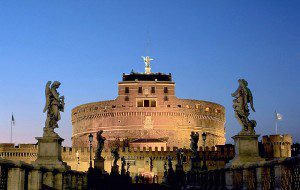
Originally constructed as the Emperor Hadrian’s mausoleum, this structure, not far from St. Peter’s Basilica, plays an important role in Puccini’s opera “Tosca.”
(Please click on the image to enlarge it.)
Photo from Wikimedia Commons
Immediately after the closing session of the 2015 conference of the Society for Mormon Philosophy and Theology early this evening, my wife and I hurtled up to Salt Lake City for the Utah Opera’s very good production of Puccini’s Tosca.
One of the most famous pieces from that opera is the aria “Vissi d’arte.”
Tosca, the title character, is an operatic diva who is faced with a horrible moral dilemma that has been cruelly and unjustly forced upon her by an amoral tyrant, in which neither option is even remotely good.
Her singing raises the terrible question of the theological problem of evil, in an extraordinarily poignant way:
I lived for art. I lived for love.
I never did harm to a living soul.
With a secret hand
I relieved as many misfortunes as I knew of.
Always with true faith
my prayer
rose to the holy shrines.
Always with true faith
I gave flowers to the altar.
In the hour of grief,
why, why, O Lord,
why do you reward me thus?
I gave jewels for the Madonna’s mantle,
and I gave my song to the stars, to heaven,
which smiled with more beauty.
In the hour of grief,
why, why, o Lord,
ah, why do you reward me thus?
Vissi d’arte, vissi d’amore,
non feci mai male ad anima viva!
Con man furtiva
quante miserie conobbi aiutai.
Sempre con fè sincera
la mia preghiera
ai santi tabernacoli salì.
Sempre con fè sincera
diedi fiori agl’altar.
Nell’ora del dolore
perchè, perchè, Signore,
perchè me ne rimuneri così?
Diedi gioielli della Madonna al manto,
e diedi il canto agli astri, al ciel,
che ne ridean più belli.
Nell’ora del dolor
perchè, perchè, Signor,
ah, perchè me ne rimuneri così?
Here’s an old black and white video of the immortal Maria Callas performing “Vissi d’arte”:
https://www.youtube.com/watch?v=NLR3lSrqlww
Anyone who doesn’t feel the impact of this problem, of why sometimes terrible things befall good people, anyone who hasn’t wrestled with it, hasn’t given it serious attention. Maybe “Vissi d’arte” can help.
A 1981 book entitled The Tongs and the Bones, by George Lascelles, seventh earl of Harewood, features a conversation between the Russian composer Dmitri Shostakovich (d. 1975) and the English composer Benjamin Britten (d. 1976):
Shostakovich: What do you think of Puccini?
Britten: I think his operas are dreadful.
Shostakovich: No, Ben, you are wrong. He wrote marvellous operas, but dreadful music.
With apologies to Messrs. Shostakovich and Britten, great composers both, I think that, on this point, they were flatly nuts.










